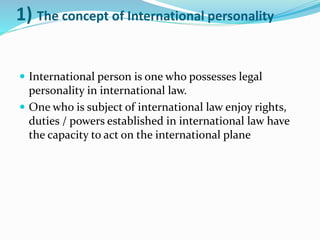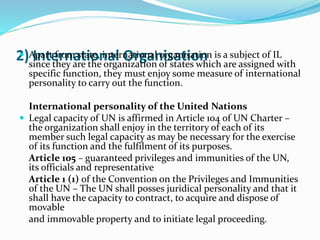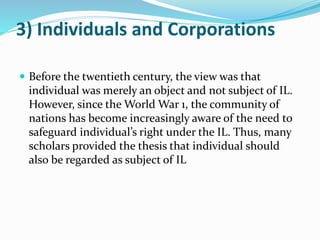Subject of International law & legal personality
- 1. Subject of Law & Legal Personality PRESENTED BY- VANDANA DHOUNDIYAL
- 2. 1) The concept of International personality International person is one who possesses legal personality in international law. One who is subject of international law enjoy rights, duties / powers established in international law have the capacity to act on the international plane
- 3. Characteristic of international personality The enjoyment of rights conferred and the subjection to obligation imposed by international law. Capacity to enter into treaties and agreements valid on the international plane Capacity to make claims in respect of breaches of international law The enjoyment of privileges and immunities from national jurisdiction
- 4. Subjects of International Law State International Organisation Individual and Corporations
- 5. 1) States as subject of IL Oppenheim stated four condition for the existence of states People : there must be people who live together as a community even though they may belong to different races, religion or colours. Territory : in which the people is settled. Wandering people is not a state Government : one or more persons act for the people and govern according to the law of the land Sovereignty : supreme authority which is not dependant on other authority/independent
- 6. Criteria of statehood under IL Article 1 of the Montevideo Convention on Rights and Duties of States. The state as a person of IL should possess the following qualification:- Permanent population Defined territory Government Capacity to enter into relations with other states
- 7. Defined territory The control of territory is the essence of a state Territorial sovereignty allows a state to exercise sovereignty within that territory without any interference from foreign government without its consent This concept is defined by geographical area separated by borderlines from the other state’s territory. So, the delimitation of state boundaries is of crucial importance. Absolute certainty is not required Permanent population Wandering tribe do not qualify to be a state There must be a people linked to a specific territory on a more or less permanent basis and who can be regarded as its inhabitant Western Sahara’s case It was noted that the territory of the Western Sahara is populated by a nomadic tribe who go freely across the desert. However, it was held that their link with the territory is such that they may be regarded as its population.
- 8. Government The government must be effective within the defined territory and exercise control over the permanent population. Aaaland Island case The main question was the date on which Finland become a state. Finland had been a part of the Russian Empire until the Russian Revolution. The parliament declared Finland’s independence on December 4, 1917. This was recognized by the Soviet Government but there was opposition within Finland which rejected the idea of independence. As a result, violence broke out and for a time, the government of the new state was able to maintain order only with the help of the Soviet troops. The International Committee of Jurist held that the exact date Finland become a state was when the public authorities had become strong enough to assert themselves through the territories of the state without the assistance of foreign troops and that was in May 1918.
- 9. Exception : The effective requirement does not apply to an established state. A state does not cease to exist when it is temporarily deprived of an effective government (due to civil war/upheavals) Somalia and Japan.
- 10. Capacity to enter into relations with other states Montevideo Convention refers ‘capacity to enter into relation’ as independence in law. Judgee Anzilotti in Austro-German Custom Union case delivered his opinion in respect of the meaning of independence : independence may also be described as sovereignty or external sovereignty by which is meant that the state has over it no other authority than that of IL
- 11. 2) International Organisation Apart from state, international organisation is a subject of IL since they are the organization of states which are assigned with specific function, they must enjoy some measure of international personality to carry out the function. International personality of the United Nations Legal capacity of UN is affirmed in Article 104 of UN Charter – the organization shall enjoy in the territory of each of its member such legal capacity as may be necessary for the exercise of its function and the fulfilment of its purposes. Article 105 – guaranteed privileges and immunities of the UN, its officials and representative Article 1 (1) of the Convention on the Privileges and Immunities of the UN – The UN shall posses juridical personality and that it shall have the capacity to contract, to acquire and dispose of movable and immovable property and to initiate legal proceeding.
- 12. The most important evidence for the determination of the international personality of the UN is the advisory opinion in the Reparation’s case September 1948 – Court Bernadotte, a Swedish national, was assassinated in Jerusalem which was in Israeli possession. He was the Chief UN Truce Negotiator in the area. In the course of deciding what action to take in respect of his death, the UN GA requested ICJ to give an advisory opinion on whether UN had the capacity to bring an international claim against the responsible government to obtain reparation. The Court in its opinion : has come to a conclusion that the organization is an international personality. That is not to say that it is a state and posses the same legal personality, rights and duties to that of the states. But it is a subject of international law and capable of possessing international rights and duties and has capacity to maintain its right by bringing international claims.
- 13. Criteria for determination of international personality In the Reparation’s case, the court outlined two criteria The intention of a states to establish an organization having a distinct legal personality detached from that of its members Can be inferred from various factors. May also be expressly mentioned in the constituent instrument of the organisation Eg : Article 4 (1) of the Rome Statute Establishing the International Criminal Court as having an international legal capacity The actual exercising and enjoying of functions and rights which can only be explained on the basis of the possession of a large measure of international personality
- 14. Rights conferred to international organisation The treaty making power Privileges and immunities Right to bring international claim The right to protection for its agent acting in their official capacity
- 15. 3) Individuals and Corporations Before the twentieth century, the view was that individual was merely an object and not subject of IL. However, since the World War 1, the community of nations has become increasingly aware of the need to safeguard individual’s right under the IL. Thus, many scholars provided the thesis that individual should also be regarded as subject of IL
- 16. Legal responsibility of individuals under IL There are norms which establish direct responsibility of an individual. Individual who commit certain crime under IL should be punished as according to IL. Eg : piracy, slace trading, genocide, war crime and crime against humanity International law directly impose a legal duty upon individual not to commit such crimes. -After WW2, international military tribunals were set up at Nuremberg and Tokyo. The judgment of the Nuremberg and Tokyo International Military Tribunal affirmed the criminal responsibility of individual under IL. The often quoted passage : crime against international law are committed by men, not by abstract entities and only by punishing individuals who commit such crime can the provision of IL be enforced.
- 17. Rights of individuals under IL Individual has some degree of international personality but to a very limited extent, much more limited than the legal personality of an international organisation. Number of rules of IL exist for the benefit of individuals but that does not necessarily means that the rules create ‘right’. One way of proving that the rights of individual exist under IL is to show that the treaty conferring the rights gives the individual access to an international court or tribunal to enforce their right. General rule : the individual have no locus standi or access to international court and tribunal, most international tribunals are not open for individuals. Exceptions (individual may be given right to appear before an international tribunal ) : European Convention on Human Rights and Fundamental Freedom – any private individuals who are nationals of state parties can bring an action before the European Court of Human Right against their own government for violations of human right.
- 18. Access to the ICJ Article 34 (1) of the Statute of ICJ provides that – only states shall be the parties in cases before the court. Individuals or corporations has no locus standi before the court If they are victim of international wrongful act of a foreign government, they have to persuade their national state to take up the case and initiate proceeding against the responsible state before the world court. Factors to be taken to initiate such international claim There must have been an internationally wrongful act committed by a foreign state against a national or a corporation of the claimant state Two requirements for the admissibility of an international claim i) Nationality of claims – there must be a linkage of nationality between the victim and the state making the claim ii) Exhaustion of local remedies – the victim must have been exhausted all the effective local remedies available at the wrongdoer state Jurisdictional requirement : Article 36 of the Statute of ICJ – the court can exercise jurisdiction only with the consent of both state parties to the dispute
- 19. Case : Nottebohm Corporations Corporation or companies usually are treated as the same as individuals. Normally, their relationship with states is governed by the domestic law. However, it is possible that a contractual relationship between a corporation and a states be governed by international law. Eg : Texaco v Libya case Concession agreement for the extraction of oil might be an internationalised contract subject to rules of international law. But such contract are at the discretion of the host state and they do not confer international legal personality on the foreign companies.
- 20. THANK YOU



















